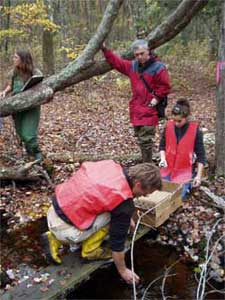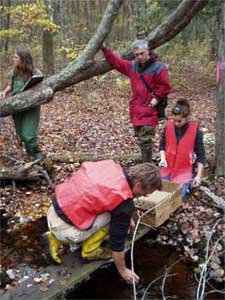 KINGSTON, R.I. – January 21, 2009 – Art Gold, professor of watershed hydrology in the University of Rhode Island Department of Natural Resources Science, has received a five-year appointment as a senior advisor to a United Nations Research Coordination Project on water conservation and water management.
KINGSTON, R.I. – January 21, 2009 – Art Gold, professor of watershed hydrology in the University of Rhode Island Department of Natural Resources Science, has received a five-year appointment as a senior advisor to a United Nations Research Coordination Project on water conservation and water management.
Sponsored by the U.N. Food and Agricultural Organization and the International Atomic Energy Association, the research project explores the role of wetlands in augmenting water supplies and improving water quality in developing countries in Africa, Asia and Eastern Europe.
“We’re setting up common research projects in the participating countries in an effort to see if local communities can restore and protect wetlands as a way of enhancing water quality and expanding water storage capabilities,” said Gold, an international expert in watershed science who resides in North Kingstown. “We want to improve local knowledge of best practices and apply our scientific expertise to address their challenges.”
Gold said that the very different environmental conditions in the participating countries make the project especially difficult. The unifying factors, he said, are nitrogen and water flow.
“Nitrogen is a common fertilizer around the world, and many types of agriculture leak nitrogen, which causes water quality problems,” he explained. “I will help them tailor state-of-the-art methods to their unique climate, geology and agricultural settings to provide new insights on the sources and losses of water and nitrogen in their watersheds.
Gold leads the water quality programs at the University of Rhode Island, including the Watershed Watch program that uses volunteers to monitor water quality in the state’s ponds and streams, and the Northeast and Caribbean Islands Integrated Water Program, a regional project that brings together scientists from nine different states to investigate and solve watershed and water quality problems. He has developed cutting-edge field techniques to measure nitrogen in watersheds, and he has studied how best to scale up research results from small samples at one wetland and apply it on a larger scale to entire watersheds and countries. He has published 150 scientific articles and attracted more than $13 million in grants.
Gold met with the participating researchers in Vienna last month to launch the project and provide initial training. A follow-up meeting in Estonia will take place later this year.

